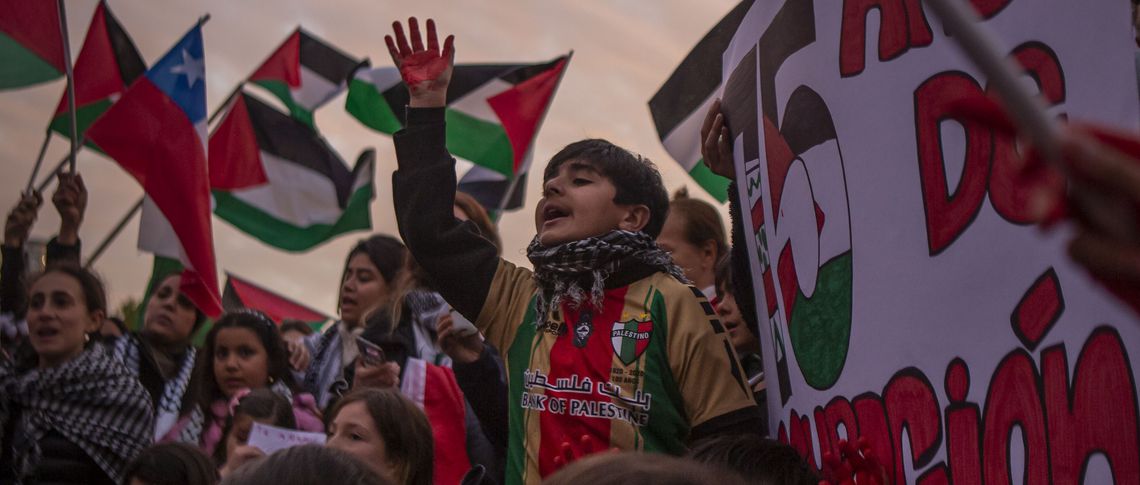The political polarisation that comes along with the ‘zero-sum’ narratives of the majority of armed conflicts across the world has reached a new level. Spaces for talking peace and developing short and long-term solutions through mutual agreement are now largely closed. In this increasingly bitter climate, even agreements on humanitarian ceasefires and corridors cannot gain the necessary minimum consensus, despite the serious consequences for civilian populations.
Visible examples here include the war between Russia and Ukraine, the dispute between Armenia and Azerbaijan over control of Nagorno-Karabakh, and now the military escalation between Hamas and Israel. Paralysis in the face of the human cost of using military force is also apparent in low-intensity conflict scenarios, where states have lost their monopoly on the use of force to ensure minimum conditions of security. The resulting flight and expulsions leave migrants at the mercy of violence without international protection.
Impacts of the conflict in the Middle East on Latin America
Latin America occupies a special position in view of the increasing number of conflicts around the world. Through its location on the periphery of the Western world, this part of the Global South benefits from its low military strategic importance and its geographical and cultural distance from the wars outside the region. In the years after the Cold War, but especially after 11 September, the region kept a distance from the main international geopolitical centres of conflict, while maintaining its commitment to peace in the region and the peaceful resolution of the territorial controversies there.
However, the outbreak of the conflict on 7 October with Hamas’ terrorist attack on civilians in Israel also affects Latin America. Three factors link the region to the war: first, the countries’ historical and contemporary positions toward territorial disputes, and competing claims between the State of Israel and the advocates of the Palestinian cause. Second, the domestic political context of each national reality, in which the weight and voices of communities of Jewish and Arab-Palestinian origin influence the media and shape public opinion. And third, the degree of autonomy vis-à-vis the United States, combined with the importance of relations with Israel in Latin American foreign policy.
The differing responses of the Latin American countries to the conflict reflect not only immediate humanitarian considerations but also the individual positions taken since 1947 on the establishment of the State of Israel and the postponement of recognition of a sovereign Palestinian state.
A non-exhaustive inventory allows us to examine the mosaic of the diaspora in the region and the impacts of the conflict. Chile is home to nearly half a million Chileans of Palestinian origin, the largest Palestinian community outside of the Arab world. Three Israelis of Chilean origin were killed, and one hostage is being held by Hamas. In Argentina, the Jewish community is the fourth largest diaspora in the world with 180,000 people; eight Argentines were killed, and 22 hostages are being held by Hamas. In the case of Brazil, three Brazilian citizens were killed, and the government is seeking the release of 29 hostages held in the Gaza Strip. Brazil has a Jewish community of about 120,000 people, the second largest in Latin America, and around 60,000 Palestinian refugees or immigrants. Colombia is home to some 100,000 Palestinians of different generations, while around 2,000 Jews live in the country. Two Colombians were killed in the Hamas attack. There are 67,000 Jews and a small community of people of Palestinian origin living in Mexico. Two Mexican hostages are being held by Hamas. Peaceful inter-ethnic and inter-religious coexistence across different waves of migration is a Latin American speciality.
The differing responses of the Latin American countries to the conflict reflect not only immediate humanitarian considerations but also the individual positions taken since 1947 on the establishment of the State of Israel and the postponement of the recognition of a sovereign Palestinian state. In general, the region shares the support, as expressed in repeated UN votes, for the creation of two states, continues to support the Oslo agreement and has expressed its humanitarian solidarity with the Palestinian people. The differences in Latin America’s foreign policy positions have been, and continue to be, influenced by the level of toleration of the United States.
Autonomy-directed diplomatic actions have included expressions of support for the creation of a Palestinian state, leading to the expansion of the Palestinian Authority’s diplomatic activity in the region over the past 12 years. In Bolivia, support for the Palestinian cause has an ideological colouring linked to domestic political affiliations and international orientations. On the other hand, the State of Israel’s territorial ambitions have found the support of far-right political leaders in the region, in some cases bolstered by cooperation with the Israeli military and intelligence services. However, these extremes have not diminished the immediate emphasis in the region on a common basis of humanitarian sensitivity given the lives claimed by the conflict.
A growing frustration of the West
Comparing the effects of the war in Ukraine and the conflict in the Middle East, we can observe a spiral of frustration and mutual incomprehension between Latin America and the Western powers. In the first case, the lack of unity manifested itself in the unheard calls for economic sanctions against Russia and military support for Ukraine, which were formulated by the highest European and US authorities. The main point of conflict today is that Washington unconditionally supports Israel’s military response, thereby ignoring the cost of human lives among civilians in Gaza, and legitimising the rejection of a ceasefire and the opening of humanitarian corridors in the name of the right to defence. The point at which Latin American positions converge prioritises international humanitarian law over other considerations related to terrorism and the territorial disputes at stake.
This common understanding is not the result of intraregional negotiations but of a collective diplomatic memory that invokes the primacy of international law. Replacing this with a scenario in which countries in the region take dominant positions on one side or another in a conflict would have three negative consequences: it would open the way to extra-regional alliances, exposing the area to external and costly pressures and tensions, divert the central political focus away from the humanitarian issue, and, ultimately, exacerbate internal political polarisation and regional fragmentation. At the same time, a realisation that neutrality is not enough is driving diplomatic positions in the region, as Bolivia, Colombia and Chile have shown. The Bolivian government has severed ties with Israel to underscore its unwavering support for the Palestinian cause, while the Colombian and Chilean governments have recalled their ambassadors from Tel Aviv. For the Colombian government, this was a response to a verbal exchange between the president and the Israeli government, while the Chilean government expressed its dissatisfaction with the humanitarian consequences of the Israeli military attacks.
In the name of humanitarian commitment, Latin America wants to voice its criticism and concern at the risk of the world powers repeating mistakes that only worsen the banality of evil on a global scale.
At the level of global governance, the paths of dialogue and negotiations to contain and reverse the humanitarian consequences of the Israel-Hamas conflict remain ineffective. In October, six draft resolutions were discussed in the Security Council under the Brazilian presidency. All failed. Added to this was the low effectiveness of the resolution adopted in the General Assembly for an immediate humanitarian ceasefire in the Gaza Strip. This resolution received majority support in the region, with some exceptions: in the north, Panama and Guatemala voted against, while in the south, Paraguay and Uruguay abstained.
Brazil’s performance as chair of the Security Council, in which Ecuador is the region’s second rotating representative, pointed to Latin America’s commitment to active multilateralism. Ultimately, Brazil relied more on the support of the UN Secretary-General than on that of the permanent members of the Security Council, who insisted on exercising their vetoes.
The commonalities of Latin America in the face of the war in the Middle East make it necessary to come up with viable unarmed humanitarian options to provide for the civilian population, secure the release of hostages, accelerate the ceasefire and activate multilateral mechanisms against war crimes, especially the International Criminal Court, as well as point to possibilities for dialogue towards inter-religious peace, as it exists in the region. In the name of humanitarian commitment, Latin America wants to voice its criticism and concern at the risk of the world powers repeating mistakes that only worsen the banality of evil on a global scale.










